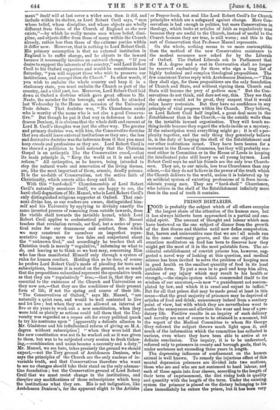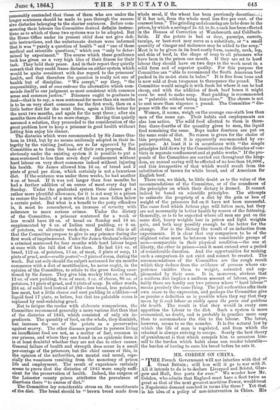to try his nostrums upon" [apparently a delicate allusion to
the report of the Medical Committee to whom Sir George Mr. Gladstone and his infinitesimal reform of giving an M.A. Grey referred the subject throws much light upon it, and degree without subscription] "when they were told that much of the information which the committee has collected is the new constitution was not to be worked out as it was given curious, even where they have been able to arrive at no to them, but was to be subjected every session to fresh tinker- definite conclusion. The inquiry, it is to be understood, ing,—combination and union became a necessity and a duty." referred only to prisoners in county and borough gaols, that is, reasonably contended that those of them who are under the longer sentences should be made to pass through the succes- sive dietaries belonging to the shorter sentences. Before com- mencing their labours the Committee desired definite instruc- tions as to which of these two systems was to be adopted. But the Home Office under its present chief does not give defi- nite instructions, and the unfortunate doctors were informed that it was "purely a question of health" and "one of those medical and scientific questions," which can "only be deter- mined by experiment." The course which these gentlemen took has given us a very high idea of their fitness for their task. They held their peace. And in their report they quietly remark that they could frame dietaries on either system which would be quite consistent with due regard to the prisoners' health, and that therefore the question is really not one of health but of discipline. "We accept," say they, "the responsibility, and at once embrace the alternative which com- mends itself to our judgment as most consistent with common sense and common justice." Prisoners ought to graduate in food—that is to say, a man sentenced for more than six months is to be on very short commons for the first week, then on a little better diet for the next three, again a little better for the next two months, and again for the next three ; after six months there should be no more change. Having thus quietly assumed a solution they proceeded to the consideration of the great problem how solution, keep a prisoner in good health without letting him enjoy his dinner. The dietaries which were recommended by Sir Tames Gra- ham in 1843, but by no means uniformly adopted in their in- tegrity by the visiting justices, are so far approved by the Committee as to form the basis of their own proposal. But obviously under the existing system it is possible to put a man sentenced to less than seven days' confinement without hard labour on very short commons indeed without injuring his health. Sir James allowed him 16 oz. of bread and 2 pints of gruel per diem, which certainly is not a luxurious diet. If the sentence was under three weeks, he had another 8 oz. of bread. If it was not lqnger than four months he had a further addition of an ounce of meat every day but Sunday. Under the graduated system these classes get a rather more plentiful allowance, for it is not easy in a prison to restore the health of a man when it has once fallen below a certain point. Bat what is a benefit to the petty offenders is it must be remembered, an increase of severity with reference to more serious crimes. Under the dietary of the Committee, a prisoner sentenced for a week or less would have 20 oz. of bread on Sunday and 18 oz. supplemented by 6 oz. of Indian meal pudding, or 8 oz. of potatoes, on alternate week. days. But then this is all that the Committee propose to give to any prisoner during the first week of imprisonment. -Under Sir James Graham's dietary a criminal sentenced for four months with hard labour began at once with the full diet of his class. He had 154 oz. of bread, 112 oz. of potatoes, 16 oz. of meat, 3 pints of soup, 11 pints of gruel, and—credits posteril-3 pints of cocoa, during the week. But not only should the culprit sentenced for six months commence with a diet of mortification, he never ought, in the opinion of the Committee, to attain to the gross feeding sanc- tioned by Sir James. They give him weekly 104 oz. of bread, 12 oz. of suet pudding, 8 oz. of meat, 4 oz. of cheese, 96 oz. of potatoes, 14 pints of gruel, and 3 pints of soup. In other words, 224 oz. of solid food instead of 282—less bread, less potatoes, less meat, but a little cheese and suet pudding in addition—of liquid food 17 pints, as before, but that too palatable cocoa is replaced by soul-subduing gruel.
Not to fatigue the reader with elaborate comparisons, the Committee recommend generally a more various diet than that of the dietaries of 1843, which consisted of only six in- gredients. The quantity of food, on the whole, they diminish, but increase the use of the potato as a preservative against scurvy. The other diseases peculiar to persons living on insufficient food are not, as a matter of fact, common in our prisons, and where they are found in an epidemic form it is at least doubtful whether they are not due to other causes. General failure of health and strength does occur in a small per-centage of the prisoners, but the chief causes of this, in the opinion of the authorities, are mental and moral, espe- cially the weariness resulting from the monotony of prison life and employment. The result of experience certainly seems to prove that the dietaries of 1843 were amply suffi- cient for the preservation of health. Indeed, the surgeon of the Leicester county prison attributes the prevalence of diarrhoea there "to excess of diet."
The Committee lay considerable stress on the constituents of the diet. The bread should be "brown bread made from whole meal, if the wheat has been previously decorticakd ; if it has not, from the whole meal less five per cent. of the coarsest bran." The grinding and cleansing are to be done in the prison, by which a saving of 2s. 6d. to 3s. a sack has been effected in the Houses of Correction at Wandsworth and Coldbath- fields. If the potato is bad or dear, parsnips, carrots, turnips, or beet-root may serve as a substitute, or "a small quantity of vinegar and molasaess may be added to the soup." Meat is to be given in its least costly form, namely, neck, leg, and shin of beef, in the shape of soup to all prisoners who have been in the prison one month. If they are set to hard labour they should have on two days in the week meat in a solid form and of superior quality. For this purpose the Committee are "able to recommend the South American beef packed in its moist state in bales." It is free from bone and is now sold at from twopence to threepence the pound. The Committee would mingle it with fresh fat where it can be had cheap, and with the addition of fresh beef bones it might even be used to make soup. Suet pudding is recommended as "palatable without being luxurious." The cheese is not to cost more than sixpence a pound. The Committee "dis- pense with the use of cocoa." Women, it seems, weigh on the average one-sixth less than men of the same age. Their habits and employments are also leas active. The solid food allotted to them is there- fore three-fourths of the quantity given to men, the liquid food remaining the same. Boys under fourteen are put on the same scale of diet. No reason is given for the choice of this proportion, but it is apparently recommended by ex- perience. At least it is in accordance with "the simple principles laid down by the Committees on the dietaries of con- victs in separate confinement and at public works." If the pro- posals of the Committee are carried out throughout the king- dom, an annual saving will be effected of no less than 16,0001., and this irrespective of that which would result from the substitution of brown for white bread, and of American for English beef'.
There can, we think, be little doubt as to the value of the recommendations of the Committee, or of the soundness of the principles on which their dietary is framed. It cannot indeed be based on scientific principles. The attempts to estimate the propriety of a diet by the gain or loss of weight of the prisoners fed on it have not been successful. The same food which fattens pigs will fatten men, but they are not necessarily in better health by reason of the fattening. Generally, as is to be expected where all men are put on the same diet, heavy weights lose in prison and light weights gain, and both may possibly enough be the better for the change. Nor is the dietary the result of an induction from experiments. It is clear that any comparison to be of the slightest value must be between two considerable groups of men—comparable in their physical condition—the one at liberty, the other in prison—and it must extend over a period of considerable duration. And the opportunities for making such a comparison do not exist and cannot be created. The recommendations of the Committee are the rough result which they deduce from the evidence of persons whose ex- perience entitles them to weight, corrected and sup- plemented by their own. It is, moreover, obvious that a uniform diet implies a uniform amount of labour, and pro- bably there are hardly any two prisons where "hard labour" means precisely the same thing. The jail authorities affix their own sense to the expression, and perhaps the Committee give as precise a definition as is possible when they say that they mean by it such labour as visibly opens the pores and quickens the breath. The result is that they would in every case apportion the labour to the diet. Such a system is more economical, no doubt, and is probably in practice more easy than to accommodate the diet to the labour. The latter, however, seems to us the sounder. It is the natural law by which the life of man is regulated, and from which the criminal is always striving to escape. Surely the best theory of punishment is that which compels him to accustom him- self to the burden which habit alone can render tolerable— the burden of having to earn his bread before he eats it.































 Previous page
Previous page